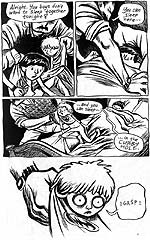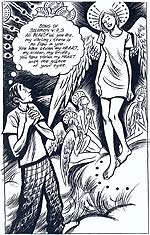 Craig Thompson's "Blankets"
Craig Thompson's "Blankets" |
Now "Blankets" has officially arrived, debuting to significant buzz at the MOCCA Art Festival (see TIME.comix coverage). Anticipation was high thanks to Thompson's previous (and first) book, 1999's "Good Bye Chunky Rice." An allegorical fantasy about lost friendships that featured cute talking animals and oddball characters, fans of "Chunky Rice" will be surprised at the change in Thompson's approach. No longer allegorical, "Blankets" is grounded in autobiographical reality. Yet "Blankets" has the thematic sophistication, emotional sweep and beauty of (visual) language that mark the best novels of any kind.
Set in the snowy woods of central Wisconsin, "Blankets" tells the story of Craig Thompson's coming of age in the austere world of a fundamentalist Christian family. Blankets of various kinds become the book's motif, starting with the opening scene. As a boy Craig must share his bed with his younger brother Phil, causing an argument over the blankets. Their stern father thumps up the stairs and looms over them like a giant, forcing Phil to spend the night in the dreaded "cubby hole" under the stairs. The guilt that Craig feels over not protecting his brother becomes even more acute when a neighborhood boy who baby-sits them molests both boys. Childhood seems made of woe for the sensitive boy who suffers impoverished discomforts at home and ridicule at school. Craig finds escape in dreams, drawing, and his Christian belief. All of this carries through as Craig falls into adolescence. "This world is not my home; I'm only passing through," thinks the teenaged Craig while being harassed at school.
 Phil is taken to the "cubby hole" while Craig cowers
Phil is taken to the "cubby hole" while Craig cowers |
Struggling with faith becomes one of the major themes of "Blankets." As he nears the end of high school, Craig's pastor urges him to try the ministry. Craig has his doubts. These are fired in the crucible of a Christian winter camp that he attends every Christmas. Artistic rather than athletic and unable to pay the skiing fees anyway, he feels outcast by the uniform and exclusionary Christian community there. More importantly, during his junior year at the camp, he meets Raina, a pretty, thoughtful and similarly alienated girl. All at once, along with everything else, the book becomes a charming teenage romance novel. Craig and Raina feel an immediate attraction to one another and the arc of this relationship becomes the book's backbone.
After camp Craig corresponds with Raina, who lives in Michigan, and eventually coaxes his parents to let him visit her. The entire middle section of the book details this brief visit. Thompson puts a tremendous amount of work into depicting Raina's family life. Her parents are in the midst of a divorce at her mother's behest. Exhausted and possibly addicted to pills, she leaves the care of her two adopted, mentally disabled adult children mostly in Raina's hands. It's a testament to Thompson's intelligence as a storyteller that this sub-portrait becomes as fascinating as the main story. Raina's parent's difficulties have a parallel to Craig's own struggles . Raina describes them as "idealistic at first, but without enough strength to carry through with their commitment."
 Raina appears as an Angel and the Song of Solomon is sung in Craig's ear
Raina appears as an Angel and the Song of Solomon is sung in Craig's ear |
But the real drama lies in whether Craig and Raina will have sex. Self-conscious, filled with associations of sex with abuse and punishment — hellish flames lick the background as he puts on his pajamas — Craig feels deeply conflicted. Thompson does a wonderful job of recreating the chemistry between the nurturing Raina and the lonely Craig. You can feel that special, adolescent magnetism that comes from two alienated teenagers. In a key moment, Raina gives Craig a crazy-quilt blanket that she made. In return she asks him to paint a mural on her bedroom wall. In Raina, Craig finds his muse and reconnects with the urge to draw that he had recently abandoned as a pointless waste of God's time. This being a comic, we actually get to see this inspiration manifested. Thompson indulges in pages of Raina sleeping or typing, surrounded by fantastical imagery. She appears as a goddess and an angel surrounded by cherubim. It's a peerless example of form meeting content as only comix can achieve.
The art of "Blankets" plays a major part in the complex yet simple experience of the book. Thompson combines the detail of illustration with the dynamism of cartoons in his wonderful black and white drawings. Using both pen and brush he moves effortlessly from realism to expressionism as when demons shoot out of Craig's mouth during a purging of his childhood drawings. The layouts carry through this playful variety with every conceivable kind of design. The comforting hum of a basement boiler wraps around a room and hugs it with warmth. Later when Craig departs from Raina, in a typically poignant image, the car he's in plummets off the edge of the world.
The remaining third of the book follows the denouement of Craig and Raina's relationship. Even before he departs Craig senses Raina distancing herself. As the springtime thaws the blanket of snow, Craig struggles to find himself. He must figure out how to deal with the loss of Raina. He must decide what to do with himself after high school. And both of these are tied into his reconciling the Christian doctrine he was raised on with the realities of his experiences and interests. Unlike less thoughtful depictions of such choices, the answers are not patently obvious. Thompson has carefully and beautifully lain out the complexities of this crucial period in everyone's life.
By the end, Craig Thompson's "Blankets" has walked us along the path from Craig's childhood to maturity with extraordinary grace and sensitivity. Part teen romance novel, part coming-of-age novel, part faith-in-crisis novel and all comix, "Blankets" is a great American novel.
"Blankets" will be available next Wednesday at smart comic shops and at regular bookstores sometime the following week.
